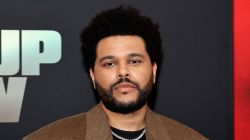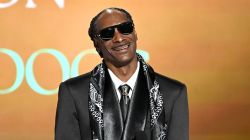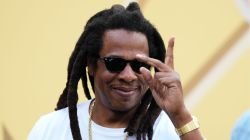An interesting thing happened during the first week of April 2013. After years of delays, Papoose’s The Nacirema Dream debuted. And during its first week of release, Papoose’s SoundScan numbers were higher than the likes of Maroon 5, Linkin Park, David Guetta and other major label artists. It was a validation of sorts after Papoose and Jive parted ways back in 2007. And while Pap was happy to see fans paying for his music, he doesn’t put too much stock into SoundScan numbers.
“They try to make it sound like it’s about how many records you sold, how much money you got or how much of a gangster you are,” Papoose noted. “Hip Hop is not about none of that shit! Hip Hop is about being outspoken and being effective with letting people hear your thoughts.”
On Nacirema Dream, those thoughts covered topics such as the industrial prison complex (“Law Library”) and terminal illness (“Cure”) among others. So while a multiple-week run on Nielsen’s SoundScan sales chart may not be a hallmark for Papoose, finding his independent album that has been seven years in the making on such a list is an accomplishment. As such, the Brooklynite gave his thoughts on exactly what the numbers mean, his role in the marketplace and how he compares his mixtape hustle to what’s going on today.
And, in efforts to be transparent, we directly apologized to Papoose for not reviewing The Nacirema Dream. So any of you Pap fans with hurt feelings can kindly stop spamming up DX’s comment section and use this iTunes link to purchase another copy of the project if you’re really that hurt about us not reviewing it.
Papoose Reacts To Independent Success Of “The Nacirema Dream”

HipHopDX: I guess HipHopDX owes you an apology for not reviewing The Nacirema Dream. I was pleasantly surprised to see you on the Soundscan 200 for a few weeks in a row. What was your initial reaction when you saw the sales?
Papoose: I was happy, man. I was just happy at the fact that I could come out independently under my own label—which is Honorable Records. It was a big step for me to create my own label and get that kind of support from the people. Actually, I think I was on the Billboard chart for about three or four weeks. So to answer your question, I was ecstatic to see the people receive it the way they did.
DX: Since this album has been so long in the making, what were your expectations?
Papoose: All the shit I’ve been through, all the people that tried to hold me back and didn’t want my work to get out there to the masses—all of that inspired me. I just came to the point where I could go nowhere but up. I experienced it all. All the butterflies and shit that artists experience on their first album, that shit disappeared for me. It was like there was no more they could do to me. They held me back for years, did all this fuckery and tried to fool the people into thinking I’m something that I’m not. They tried to degrade my work. And when somebody’s constantly holding you back and kicking you down, you reach a point where you’re numb to the pain.
So my expectations were, “I don’t give a fuck. I’m just ready to get this out to the people…get it out to the world.” The fans deserve it. They’ve been patient with me over the years, so my expectations were success. When you’ve been hated on so much, all you can do is succeed because it becomes inspiration.
DX: You mentioned having your own label. I noticed that even back when you and DJ KaySlay were talking with Jive, your strategy was that of an artist that had their own label anyway. Where does that business savvy come from?
Papoose: Yeah, we made a mistake when we got with a major. Like you said, we were our own movement from the door. For me, that business sense just comes from having knowledge of self. I always had that idea inside me to go out and do everything on your own and not depend on nobody. I owned property and all that before I came into the music business. So I kind of knew to stay business-minded. I made that mistake of signing with a major. If I would’ve stayed independent from the door, I could have experienced this success a long time ago.
DX: It’s interesting that you bring up Knowledge of Self and Supreme Mathematics, because normally people associate that with spirituality instead of business…
Papoose: Yeah, definitely. It keeps you disciplined, focused and family-oriented. I’m all about my family, and that’s what I live for everyday. So it plays a part in your personal life, family life and business also. It helps you all the way across the board—360 degrees. That helps me get through my day everyday.
How The Physical Album Market Helped Papoose
DX: Obviously there’s been a lot of changes since you originally planned this project. The physical market for albums pretty much disappeared. What kind of changes did you have to make as you were adjusting to all of that while still wanting to put this out.
Papoose: I try not to feed too much into the changes of today as far as the game, because none of it is a change for the better in my eyes. It all takes away from the actual art form and what this thing is actually about, so I try not to feed too much into that. At the same time, you’ve got to adapt to your environment. With the physical CD situation, I was actually able to do better with physical CDs that I was with digital downloads. I’ma be real with you—for an artist like me—CDs is still a major thing.
It just feels like a myth, and I think people are cheating themselves by thinking that shit about everybody has to be all digital. There are still true, hardcore, dedicated Hip Hop fans that want to own an album. They want to posses that in their hands.
DX: You mentioned “Cure,” which features you rhyming in the first-person as a deadly disease. Where were you mentally when you came up with that concept?
Papoose: My grandmother—who gave me the name Papoose when I was an infant—died from cancer. She had 17 kids, and my mother was one of them. We’ve got like 90 cousins in my family. She was like the backbone of the entire family, and I watched her suffer and die a slow death. Her death actually inspired me to write the record “Cure,” because I wanted to create awareness. She had cancer for a long time and didn’t even know. And by the time she realized it, she went to the hospital, and they thought it was gallstones. When they cut her…once the air hit that cancer, it spread dramatically. Her not having that awareness cost her life. So through music, I thought, “Now that I have an audience and people are listening, I need to create some type of awareness.” Go to the doctor and get that checkup. It can save your life.”
DX: No doubt. You’ve got Erykah Badu on that song. And you also secured features from Mobb Deep and DJ Premier among others. How do you balance being a businessman and an artist as far as developing those relationships?
Papoose: Meeting some of those artists is like a dream come true to me. I came up listening to them. The balance for me is that I love doing Hip Hop, but obviously I got mouths to feed. A lot of people depend on me. So I have to generate revenue to provide for them. The importance of that is what drives my business sense. And as far as the relationships, I respect these people. I grew up on their music, so the relationship towards me is just authentic. It’s admiration, and they come back and tell me, “I respect what you’re doing,” and I let them know I learned from the best.
Papoose Says Artists Have Over-Commercialized Mixtapes
DX: Well aside from this project, you’ve got a very rich mixtape history. You’ve got a body of work, and you’ve won Justo Awards. What’s the biggest difference between that era and now where mixtapes are essentially free albums with no deejaying on them?
Papoose: What we were doing back then and what’s going on now is totally different. I don’t think what these dudes are doing are real mixtapes, man—I’m just being 100 with you. You’ve got an artist getting major radio play 24 hours a day…a commercial artist [making mixtapes]. I don’t consider it a mixtape when you take a bunch of songs and throw them together. When Papoose was doing his mixtapes, it was from the ground up. There was no major radio play, and it was strictly straight to the streets. Then the streets loved it and dictated that it should go to the radio. It was real; it was official. With mixtapes you need to be creative and go in, not tap-dancing all over the mixtape.
And you make a good point; there was deejaying on those mixtapes. So it was a collaboration between an artist and a DJ, which was monumental in Hip Hop. You got these dudes now that don’t even have a DJ on their mixtape. I can’t say, “Such and such has a crazy mixtape,” and there’s nothing but commercial joints on it. That’s not a mixtape. Justo left me with the crown, and I was able to win that award before Justo left. When I was doing it on that level, I felt it was more hard work, dedication and just keeping it Hip Hop. We weren’t commercializing it. It’s like, “Y’all dudes got everything else, and now y’all wanna take the mixtape game too?” And then they commercialize it by calling things a mixtape that’s not even a mixtape. You can’t even possess it; it’s something that’s on the Internet. To each his own, man. But I just think it was more authentic back then if you want to compare them.
DX: Well, we already already kind of compared eras. But as someone from the Golden Era, you remember b-boys and graffiti art. In 2013 nobody’s really break dancing or buying spray-paint. How do you participate in Hip Hop in the Digital Age?
Papoose: I just stay true to the culture. Hip Hop is something you live, and Rap is something you do. When I was taught the game, the people I learned from [stressed] you had to be nice. You couldn’t come into this shit if you was wack. Period. You had to have something intricate to say. If you was break dancing, you had to have your moves on point. If you was spray-painting, you couldn’t be what they would call a toy. You had to come to the table with something incredible or else you got kicked out of the cypher and couldn’t contribute.
So nobody can ever make me believe this is about anything but talent and ability. They try to make it sound like it’s about how many records you sold, how much money you got or how much of a gangster you are. Hip Hop is not about none of that shit! Hip Hop is about being outspoken and being effective with letting people hear your thoughts. Whatever you was doing, you was creative, you was sharp and on top of your game. Because if you wasn’t, you was gonna get shitted on. I just think nowadays they try so hard to make us think it’s about Twitter followers and all this shit that has nothing to do with Hip Hop and doesn’t make you a great artist.
They would never be able to make me forget what this is about. So as long as that’s embedded in my brain, I will always have my relationship with Hip Hop. If you’re a rapper, it’s about being nice. I don’t give a fuck about none of that other shit; none of that matters to me. When I look at an artist, I judge them by their lyrical content and nothing else.
DX: You kind of run the gamut between having punchlines, music of substance and also flipping different styles. How do you strike that balance between what KRS-One referred to as “Edu-tainment?”
Papoose: That was always what I wanted to bring to the table. If you listen to my movement, it still applies. It represents the educated thug, which is talking about some of the things that’s going on in the ghetto—the hardships of being a thug growing up in Bed Stuy, Brooklyn. But it’s also giving you solutions to be educated about it, have knowledge of self, going to the law library and things of that nature that can help you get up out of these situations. So my message always was not just giving you a negative or just a positive, but both. If I just gave you one or the other, I wouldn’t be giving you the truth.
So I always wanted to keep that balance and not be one-dimensional. As far as entertainment, I feel like I can entertain people just by being myself. A lot of dudes try to follow trends and feel like they gotta fit in with what’s going on. I feel like being intricate with the punchlines and the concepts is entertaining alone. I’m a fan of Hip Hop first, and as a fan, I know what entertains me. You don’t gotta be dancin’ around like Sambo or some idiot…you don’t have to sell your soul. That’s the biggest misconception. You can be yourself, speak from the heart and use your talent to entertain. So that’s how I do it. I just stick to what I was taught by the all time greats.
RELATED: Papoose Discusses The Release Of Nacirema Dream Illuminati Symbols In The Media













FLOP AND BROKE
yea yea yea but your here leaving a comment on a “flop and a broke” nigga…off yourself…
LAME AND HATIN
this article is VERY misleading. Papoose sold 5,000 albums first week, but this article says his sound scan was higher than Maroon 5 & Linkin Park.
And? misleading? to whom exactly….and why do you give so much of a fuck about album sales? who are you an a&r? oh are you now? well then sporty how many albums were shipped? domestically? internationally? how many were actually sold? how many digital sales? etc etc ok then worrying about who sold what is not of your concern! stay in your place! who cares if his numbers were better or worse than maroon 5 or whoever else..did that ruffle your feathers or something? the fact they said papoose outsold maroon 5? I swear you noobs kill me! you sound just as devilish as these industry execs…tryin to clock album sales like you know the science behind it all…foh…
What are you talking about?! He had over 10k his first week.
My dude did u listen to the album or what and if so did u enjoy it???
Thats all that should matter
Smart guy and beast on the mic. Too bad label fucked him up. The Nacirema Dream is a great album and coulda been classic back in 2007 or 2008. Now it sounds kinda dated production wise, but it’s still a great album.
classics are timeless
5,000 albums on your own is pretty good. Respect this man no one is giving him shit you are watching him take it. He’s coming up in a similar fashion to Jay Z
too bad he literally is Jay-z’s age. He 10 years too late to be starting where Jay started now
jay-z is 8 years older
pap is younger than 2 chainz
Age ain’t nothing but a number… but if a nigga change his whole style to appease a new audience (ahem… Jay-z), then yall young niggas could start coming at them bum ass ol heads
yup 4 comments, Im not surprised. yet he’s saying the same shit you trolls try and articulate every single day…anytime its something worth getting behind you internet cowards are nowhere to be found…what you saving all your venom for a lil wayne post? u guys are a cancer to the culture man smh…
^^^^TRUTH^^^^
go tru’, mi bredda.
Shut the fuck up hiphopdx you didn’t even review his album! Fuckin hypocrites!
real talk
…but its big to admit mistakes so respects for that.
When you review it I’ll fuckin buy it:) I bought Kweli’s eardrum in 2007 thanks to hiphopdx’s review I turned down Tony Yayo’s to Kanye West’s late registration because of amazon review. So quit reviewing garbage mixtapes and albums from garbage artists and star reviewing those of real artits and also quit telling us hip hop consummers what to do!
You pretentious following fuck. “I need The industry to tell me if it’s good, if Dx says it’s wack… i ain’t buying it” Such a fanboy thing to say… go back to your mom’s basement where you belong you fucking nerd.
I only half agree with you
I’ve bought the album twice.. Best hiphop project this year. IDC what the industry says.
bum ass Pap and has been Premo standing in Jewtown Brooklyn hoping for handouts from the beards nice or maybe frum pussy likes bum ass dark meat??
WHAT?? Pussy come to Brownsville bushwick or crown heights and say that shit…
this people didnt review papoose album now they tryin to make up useless website
what would papoose say if he sold 1000.000 albums in his first week?
You are a liar bitch.
this nigga still rapping? Nigga is 50 years old or something with one release under his belt. Get job at mc donalds nigga nobody interested in your old ass.
hes 35, theres cat older than him with no albums out
calm down guys…I completely agree with Pap and the mixtape thing. Its so easy to put out music, and you have artists putting out a whole bunch of mixtape songs that are just ok. I’d much rather have it that an artist puts out one great cd every two years. Someone like PUsha comes to mind as a guy who has put out too much material in the past 3 years that wasnt an album. his album is dropping this summer, but a guy like that-one who has punchline after punchline that make you spin it back-he should save some of those lines and put them on the real album. Most of these mixtapes today, people play the for like 2 weeks then throw them away and thats it.
you could be writing about fat fuck Action Bronstein also… bum had no real songs to begin with yet there’s 8000 mixtape variations of the same sex, weed and jokes… whitey still eats it up but for how long?
not to mention his style is sort of just a ghostface parody
@ both ANONs Agreed… Action Bronson is WACK.
hhdx didnt even wanna review paps album even tho ppl in the comment sections was wonderin what was good w pap album..shit has 0 buzz just dropped one day. atleast they finally got him
i really like pap and always have, dude can spit his ass off but his album sucked. beats were trash. shit sounded dated. and good music doesnt have an expiration date. i dont like how he has become a target to rap nerds for his “corny” punchlines. he is a writer, definitely goes in there to spit his ass off and give ppl something to think about. he needs one producer that can give him a unique sound, unfortunately hes been doing this over 10 years and still hasnt figured it out. he has elements of big l and canibus in him. has that new york flavor. he just doesnt have the intangibles. possibly the worst album roll out ive ever seen. i feel like if pap had someone telling him what works and what doesnt hed be way better off. take the music out his hands and just let him SPIT. he needs a real producer.
Pap album sucks, Pap live sucks, he looks like he’s missing a chromosome, how the fuck this bum actually pay his bills? Don’t lie and say “yo, Pap heavy in the streets” because that’s straight bullshit.
pap is a g. hes heavy in the streets. word.
LOL PAPOOSE IS HEAVY IN NEW YORK, HE NICE, HIS BEAT SELECTION IS NOT ALL THAT GREAT, BUT HE GOT BARS. ALOT OF HATE FOR PAPS… I GUESS THAT HAPPENS WHEN YOU SELLING ALBUMS INDEPENDENT.
Pap is a lyrical dude in the age of popcorn rap, which is a disadvantage. One thing that many don’t know about pap he is very wise with his money and owns property. Just food for thought.
Can’t say I dig fam musically, but he appears to be a reasonably intelligent/humble brother…i wish him the best….
Damn y’all mad at a website for not reviewing an album when y’all lazy asses could’ve just went and bought it and made the decision yourself on whether you liked it or not. That’s the problem with today’s people that listen to music. You have to be told what’s good or not in order for you to rock with it. I’ve never bought an album based on a review. I made my own damn decision to get it based on singles or past music by that artist. Y’all are all soft babies with no mind of your own. The very ones who wouldn’t buy his music despite all your b!tching on here.
Dude if i like an album i go read the review on it because i’m curious to hear others opinion on it. Nobody tells me what music is dope or not. The fact of the matter is Dx wasted album reviews on rappers thats so horrible i won’t mention their names but when Pap dropped they wouldn’t even give him the time of day and thats y folks are upset. I would love to read an album review of one of my favorite artists on a Hip hop website i respect…..or ehh used to respect anyway.
One more thought…I could care less about a DJ being on a mixtape. The absence of a DJ, on a mixtape, don’t make it less “Hip-Hop”. For any artist who still needs a DJ on their mixtape, that just pretty much means that you can’t hold your own and you need the help of another name (the DJ) to draw attention to your music. If you want a real idea of what people think of you or your music…don’t have a DJ hosting it. That way you know all the plays/downloads you get (or don’t get) are because of you and not a DJ. So would Papoose still have gotten recognized back in the day if he wasn’t backed and co-signed by DJ Kay Slay? I doubt it, not at the same level of recognition anyway. DJ’s nowadays don’t even help to promote the project that they have been paid to host…that’s considered an extra charge.
Shit I happy some of these mixtapes don’t have DJ’s. Nobody want to hear loud mouth niggas all over the tracks
Dick head, the point is to tap in to the DJ’s fan base the way you do when you collaborate with another artist to build your fan base! SMFH! Why do you think artists try to do at least one Gangsta Grillz Mixtape with DJ Drama? This is why Hip Hop is loosing… A bunch of bum ass fans that steal all the music and comment on the business side of music but don’t know shit!
At commenter above me… 10000000% cosign… They hating on Pap becuz he’s not suppposed to be selling like that… but… HE IS… And he’s not worried about it as much as these bumass soundscan watching faggots are. #BUTTHURT
INDY HIP HOP FUCK CORPORATE RAP!!!!
Dude you suck face it. You’ve had over a decade to pop off and you haven’t, give it the fuck up already. Kay Slay did every thing in his power to make people like you but it didn’t work. Not to mention your fiance is a better rapper than you. Reality Check.
Remy is nice but shes not better than Pap
Rappers like this slay me because in their mind they honestly believe they’re much bigger than they really are. None of us knows his financial situation. Don’t know. Don’t care. All we can do is comment based on what we know, and what we know is his career has been more of a disappointment than AZ’s. Even Waka Flaka had a 2-3 week run on Billboard. So did Yo Gotti. Doesn’t change the fact Nacirema Dream flopped. Whatever money he made off this (probably digitally) is already spent. It’s not like Remy is coming out to a major deal.
why the fuck do you care about how much a rapper sells? fuckin clown
word!! nigga what you want to see his numbers?? these new rap fans kill me with this psuedo-intelligent bullshit about album sales. SIT THE FUCK DOWN HO. YOU AIN’T SEEING HIS NUMBERS… SO WHY YOU WORRIED ABOUT IT?? Niggas worried about other niggas album sales is straight bitch shit.
Smh don’t u realize by now that the worse rappers have the best sales not includIng Jay-z and Eminem. U gonna stare a hole into Papoose’s pocket.
I am not a fan of this guy’s music at all, but I have to respect his tenacity. Good interview… nice to see the guy get the coverage he deserves, despite his cold buzz.
I don’t care, but if your day job is being a rapper then you better back that up with some respectable sales, especially if you talk all big like Papoose does.
get the fuck outta here.
it should be about the MUSIC you moron. unfortunately for pap his music sucks. i love how kids are conditioned to like or not like artists now based on their sales history. reading sales sheets and billboards. try listening to music for once, you dickheads.
Some of you is real confused!
You can’t compare Pap’s #s to Mainstream #s.
Because Pap is not only under an independent label, his own his own self-created and self-financed label!
So any sale he makes he pockets of all it, and some to iTunes of course.
Plus he left Jive WITH that 1.5M cuz of contractual clause of Jive not meeting the album release deadline.
That’s how he’s able to finance his own ventures, his own music videos, his own distribution process!
So he controls everything he does. Look how long it took just to get this album out. Plus the #’s are horrible, so he ain’t pocketing what you think he is or else he’d be rapid firing these things out. Catz like this will always look back at the one shot they had at fame and realize that they just didn’t have enough talent to make it happen. It’s not a diss, it’s just reality.
It is about the music, but also about the sales. Why do you think they track this stuff to begin with? It’s a business. Papoose’s music sucking is just icing on the cake. Now if he was Joe Budden’s situation where he was struggling then signed to Shady then at least you could say the struggle was worth it.
I think that Papoose is simply one of the best lyricists out there. But lots of people don’t want intricate lyrics that you have to actually listen to. I think he is too much for some people’s ears.
I agree that his beat selection is sketchy. The album’s beats do sound a bit dated. You can say classic music is timeless. But if somebody debuted with beats from Paid in Full, I think we would all find it a bit odd. When you listen to Paid in Full its great, a classic, but definitely dated! But you don’t mind because you know its from another era. Nacirema Dream sounds like its from 5 years ago, but it is being released in 2013! I sympathise because he is harking back somewhat intentionally, using Premier etc. But we want new-sounding shit. I think he should think outside of the box when looking for his beats. Forget that old shit, and the shitty street-banger beats on his mixtapes (obviously is some great beats on the mixtapes), go for some more up-market/different shit. Like DOOM or the NY dudes who make beats for Das Racist etc. I dunno, I know it seems somewhat counter-intuitive to his style but I think he could sound better on some other shit than he is considering. Just my thoughts.
Geez give him a break its his first album. At least let him grow as an artist.
Nigga had HEAT with the touch it remix, album was supposed to be out that year or year after. He never should have jumped on with Kay Slay.
I’m horny
I just want1 reason why Dx didn’t review his album. Its a shame to see them waste their time writing album reviews for terrible artists and then when Papoose finally drops they turn the other cheek. This website used to be good but i’m afraid those days are long over.
Papoose challenged every emcee and no one took him up on his offer. The only time someone disses him in a rhyme is after he punches them in the face. Stop acting like he ain’t a G first of all then tweet or DM your favorite rapper and ask him to stop being scared of the lyrical one and out do him. Until then the nga is Mayweather. Undefeated. Nobody not one rapper outshined son yet. Papoose U Already